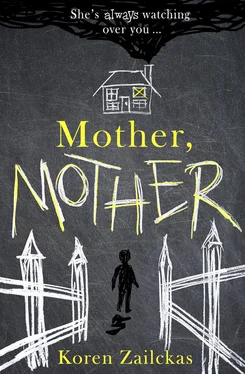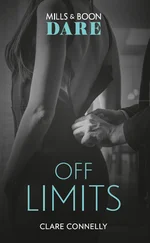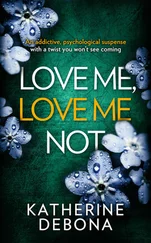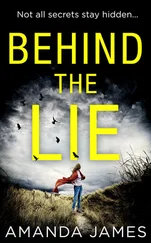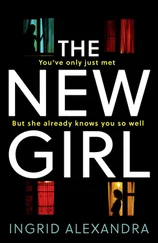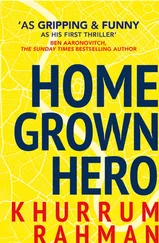After her sister left, Violet discovered that she could no longer pray to their mother’s god—the divine bully Josephine had called upon to justify her actions, especially the way she had treated Rose.
Violet had always sensed that Josephine wasn’t like other mothers, but in the past year, she’d finally been able to put her finger on the weird behaviors that made her different. Once Rose was gone, Josephine snatched Will and Violet from their places at the back of the family shelf. That was when Violet realized just how much Josephine had seen Rose as her favorite doll: someone to dress up, show off, and manipulate. Violet had always been more resistant to that kind of one-sided play: Violet wore what she wanted, tried to say what she felt, and mostly recognized the differences between herself and the stifling, spoiled woman she called Mom .
Even though Violet could sympathize with Rose now, that was one of the main reasons they didn’t get along as sisters: Rose could grin and bear Josephine’s demeaning comments, and Violet couldn’t. Rose kept censoring what she did and said even when Josephine wasn’t around, and Violet swung the other way; Violet developed an almost pathological need to point out whatever the rest of the Hursts wanted to sweep under the rug and parade it around like a skull on a stick.
Unfortunately—as Violet quickly found out—being your own person only increased Josephine’s claim on you. Josephine took credit for your good traits with her cream-of-the-crop genes. Your school or social successes were proof of her careful child-rearing. And if you veered the other way—if you became a freak and a flunky, like Violet, if you self-sabotaged so Josephine couldn’t use your achievements to build herself up—well then, the matriarch turned hate-riarch and pawned off her own evil qualities on you. She’d say you manipulated people (which she did). She’d say you were vengeful (which she , above all people, was). The game worked because the more Josephine played the victim, the more a person wanted to victimize her. The more she told you you were angry, the more pissed off it made you.
Hazy as Violet still was on the details, she knew her outburst in the kitchen had been a last-ditch effort to tell the truth about her mom to Douglas and Will. She’d never once considered that they might hear her out and still opt to believe that Josephine was just some benign mom, packing lunches and kissing boo-boos. Of course, Violet’s delivery might have also played a part. Tripping, she was no stellar speechmaker. Her main points might well have been howls and expletives.
Violet pictured Josephine at home, cracking a bottle of victory champagne. So she’d driven Violet to attack her own brother, proving at long last that she was invincible and Violet had terminal piece-of-shit-itis. All hail Josephine. Josephine had won.
TEA AT THE White House was drawing to a close. It was time for Will’s grand finale. He told Josephine that on April fourteenth, he’d gone to see a play called Our American Cousin .
“During intermission, my bodyguard left the playhouse to get trashed with my driver,” Will said.
“How do you know that word?”
“What word? Trashed? I don’t know. Violet says it. It means you’ve drunk so much alcohol that you spin without moving.”
When Josephine didn’t approve of something, her eyes went as slitted as Will’s old plastic dinosaur toys.
“Anyways, while my driver was drinking alcohol, an actor-slash-spy shot me in the back of the head. Right here .”
Will staggered to the floor. All tea parties at the White House ended this way: with Will gasping, moaning in unimaginable pain, clutching his wound, and letting his eyelids go fluttery. Like Rose before him, Will relished his acting skills. Usually he could make his mom laugh, no sweat. But this time, Josephine didn’t crack a smile or teasingly try to catch him breathing in the grave. No matter how much she claimed she wanted to return to their routine, last night hadn’t loosened its hold on her. She might have cleaned up the splattered risotto and mopped the blood off the floors, but the kitchen still had an air of something not quite right.
Will opened his trying-hard-not-to-quiver-because-he-was-dead eyes. “What’s wrong?” he asked. “Did I do a bad job?”
“You were fine,” Josephine said. “Although you might have placed more emphasis on repealing slavery and the Gettysburg Address. Tea at the White House is a school lesson, remember? It’s not an acting exercise. We don’t just do this for the drama of it all.”
Will was crushed. He let his beard fall to his chest like a hairy necklace. “Sorry, Mom. Maybe I shouldn’t die next time?”
“It’s all right if you die.”
“I don’t need to.”
“William, I don’t have the energy for this today. You can die, okay? It’s fine by me. Maybe just don’t make such a big to-do about it.”
His mom’s gaze drifted to the window. Outside, the mailman idled in his doorless truck. He had a third-trimester-sized belly and wore shorts, regardless of season or weather. Will noticed he always left the mailbox ajar.
“People on the Internet say Abe Lincoln used marijuana.”
“Marijuana?”
“People said he was a homosexual too.”
“Oh Will, don’t be ridiculous. I really don’t have the time for this today. If we don’t get in the car now we’ll be late for the hospital.”
Ridiculous. A describing word, reserved for people and things you didn’t have to take seriously.
What was wrong with Will? He thought about that question as he climbed into the backseat of his mother’s burnt-red sedan. Ultimately, he came back to his autism, the root of his wrongness. All the Asperger’s books his mother left lying around the house said that people like Will lacked empathy. But Will didn’t think that was his problem per se. If anything, he picked up too many signals from other people. So much like a crowded radio spectrum, he was, that it was hard to get a clear reading on any one person (including himself). Every human interaction was static-ridden. Each conversation crackled.
In the rearview mirror, Will glanced at Josephine’s profile. He studied her hooked lashes and the perfect brushstroke of her nose. It was probably hard for her, faking a distant and controlled expression for the sake of Will’s comfort, but he saw her white knuckles on the steering wheel.
She sighed as she reversed past the mailbox. “So he did leave it open again. Will, will you jump out and grab the mail for me?”
The stack of mail in hand, Will noticed a seal on the back of an envelope for Violet that caught his attention. There was a musical symbol—a treble clef , he knew from his mother’s piano instruction—pressed into the dark pink wax. There was little else on the envelope, except for Violet’s name, the Hursts’ address at Old Stone Way, and a nameless New York address in the upper left-hand corner: 130 Seventh Avenue, #123.
When she slowed for the tollbooth at the Poughkeepsie bridge, Will glanced at the passenger seat, where the mail stuck out of his mother’s boxy ostrich-skin purse. It suddenly became clear to Will why the envelope looked so familiar: Missing could be either an adjective or a verb. And the New Yorker Violet knew was his lost sister, Rose, who used to put a wax kiss on everything.
THE NEXT MORNING, when the head nurse (even this seemed like a double entendre) appeared in the doorway, Violet asked her a series of questions:
“Is it possible to get a toothbrush? Am I allowed to use the phone? Have you heard anything from my family?”
Читать дальше
